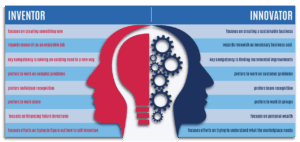Be an Innovator, Not Just an Inventor
 by Mitch Lairmore | April 12, 2019
by Mitch Lairmore | April 12, 2019
Though many people may not know Nicolas Cugnot invented the automobile and John Fitch invented the steam engine, they recognize Henry Ford and Robert Fulton as the innovators of those industries, respectively. Cugnot and Fitch were both bright inventors but neither were able to achieve fame and both died relatively poor. Ford and Fulton, on the other hand, died rich and famous.
Small businesses are often formed around new inventions. However, the skills to innovate are different than the skills needed to invent. The world needs inventions and inventors, but relatively few people are born with the skills needed to invent and innovate.
Of course, there are a few notable exceptions, such as Samuel Colt who invented the revolving pistol and George Eastman who invented photography. Colt and Eastman were able to create successful companies from their inventions and are examples of the possibility to transition from inventor to innovator and achieve great success.
If you are an accomplished inventor and you want to create a successful business from your technology, you have three options:
- Sell or license the invention and let someone else commercialize it.
The challenge is the inventor is unlikely to obtain much value for their idea. There are a lot of good ideas that need to be commercialized, so it is a “buyer’s market” for new technologies. This can be very frustrating for inventors who see a large potential for their new concepts.
- Form a partnership with someone that has innovation skills.
The obvious challenge in this option is finding the right partner.
- Take on the role of innovator.
In order for the inventor to transition to innovator, it is important to understand how inventors are different from innovators. See the infographic within this article.
The inventor likely has scientific and/or technical skills. Innovation will require marketing, technical and strategic planning skills. The invention has to work but it also needs to be economically feasible and meet a customer need better than any other alternative.
The business planning process can help inventors transition to innovators. The process of business planning requires the inventor to consider issues relevant to innovation. Organizations and investors that provide funding to inventors, such as government agencies and angel investors, will require inventors to include a business plan in their funding proposals. Investors do this because they want to foster innovation, not just invention.
Take your invention and turn it into a winning business. If you do not possess the innovation skills necessary, learn those skills utilizing local no-cost resources, such as the Florida SBDC at USF to begin transitioning from inventor to innovator.




